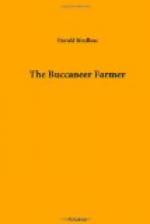On the last evening of the week, a number of the co-operators met in the kitchen at Ashness and for a time talked about the weather and the price of sheep. Askew let them talk and Kit was too preoccupied to give them a lead. He had been thoughtful since he met Janet Bell, for she had banished the self-deception he had unconsciously used and thrown a new and disturbing light on his friendship with Grace. Ridiculous as it was in many ways, he was falling in love with Grace Osborn. Moreover, he had met her an hour since and she had talked with a friendly confidence that made his heart beat. The girl liked and trusted him, and although he durst not look for more, this in itself was much. It was plain that he ought to conquer his infatuation, but he doubted if he could.
Listening to the others mechanically, he was silent and absorbed until one asked, “Weel, what’s to be done aboot coal noo? Are we gan t’ buy?”
“I dinna ken,” said another. “My womenfolk are grumelling an’ it’s lang sin’ we had good light bread, but they’re none for letting Bell have his way.”
“He’s come doon five shillings, and we’ve peat enough to fall back on if he puts up price again,” somebody else remarked. “Hooiver, I reckon he’s forced to sell and we might get anither half-croon off if we wait.”
Peter took his pipe from his mouth. “It’s a kittle point. T’ womenfolk have been patient and Bell canna rob us much if we buy from him noo. Aw t’ same, we can beat him doon some shillings if we hoad on.”
“Then hoad on and break the grasping skinflint!” said one of the younger men.
“I doot if we can break him and wadn’t say it’s wise to try. If he’ll come down anither shilling, I think we might tak’ his coal. That wad be a just price and we ought to be satisfied.”
“Let him smart!” urged the other. “He’s robbed us lang enough.”
“Well,” said Peter thoughtfully, “I dinna ken if that’s a reason for robbing him, and it’s sometimes safer no to push your enemy over hard when he’s willing to give in. You must choose. If you hoad on and force him to sell at a big loss, the fight can only end in yan o’ two ways. He’ll mak’ you pay top price for cattle food, lime, and patent manures; or you’ll drive him oot o’ dale. You must reckon if you’re strong enough.”
“We’ll hear what Kit says,” one of the rest remarked.
Kit’s mood was hardly normal. He was not often rash, but he felt sore and rebellious and this had a stronger influence than he knew. Miss Osborn liked him, but her father’s rank and traditions were daunting obstacles. Kit felt this was unjust, and raw passions and prejudices that he was, as a rule, too sensible to indulge, got the mastery.
“My father is right,” he said. “We have started a fight with Bell; he’s a dangerous man to rouse and will make us pay, unless we beat him. Besides, he has made some pay already. Old rheumatic men and young children starved by half-empty grates when the snow stopped us getting the peat, and you have seen the profits you worked hard for melt before the price Bell charged for cattle-meal. He’s been getting greedier, until he imagined he could rob us as he liked, and since he has forced us into the quarrel, my notion is we ought to fight it out.”




